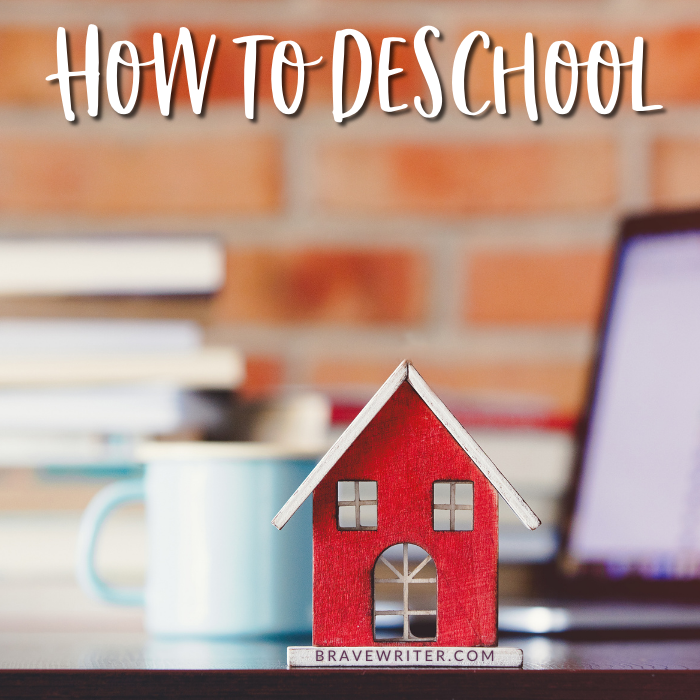How to Deschool

First a definition: deschooling is as much for you as it is for your kids. Deschooling is deliberately moving away from schoolish practices—the trappings of school. This means choosing to not grade, or sit upright in a chair while learning. It means not measuring output and finishing the workbook according to a schedule.
Deschooling is letting go of the memory of school and allowing in its place a new birth of learning through living.
Deschooling is scary for parents and it can be scary for kids who have been pulled from the school system. It can feel like you are giving up the security of knowing that education is “happening” even if “learning” may or may not be.
When I hear from parents that some of the Brave Writer strategies we love best aren’t working for them, I wonder if it is because the kids need a serious deschooling period.
For instance, if your child resists freewriting, it is most often because that child is so used to having his or her writing evaluated by you (or someone else), that little kid doesn’t really believe you when you say mistakes are allowed. It may also be that the child has so internalized a need to get it all down correctly in the first draft (to avoid the painful revision process), no matter what you say that child is living with his or her own schoolish perspective and can’t let it go.
Some parents report that their kids hate it when they jot down their ideas, stories, and thoughts for them. In many cases, this is because the child feels tricked (“she’s getting me to write and I said I will never write”). This child doesn’t want spontaneous speech to show up the next day as a paper to revise and edit.
Deschooling, then, is upsetting the schoolish expectations all of you bring to your homeschool. It’s the choice to make your home education about HOME more than school.
The Rule of Thumb
STOP all activities that anyone in the family would consider school. One way to evaluate an activity: would you do it on the weekend or in the summer or in the evening? If you would do it in any of those times, most likely that activity is not schoolish.
If you wouldn’t do it in those off hours, then you are probably trying to “sneak in school” and pretend it is for fun.
Since writing is my gig, let’s look specifically at writing.
How to Deschool Writing
First, stay away from writing for a bit (days, weeks, months, a year; depending on the level of resistance and damage)—have big juicy conversations, read aloud, enjoy poetry teatimes with yummy snacks that the kids help you bake, go to movies, visit the zoo, play board games and cards.
Instead of writing, try drawing to music for five minutes. Eliminate words completely—only free drawing of shapes, swirls, or items—but free to be whatever it is. Use multi-colored pens, lots of different kinds of music, all different sizes, colors, and shapes of paper. See what happens when you create a variety of intersections all freely, everyone together including parents. Do it on a Saturday morning! While eating donuts!
Finger paint, write on the driveway with sidewalk chalk, leave sticky notes on bedroom doors to discover in the morning—give clues to read and solve to find a treat somewhere at the end of the treasure hunt trail.
Let your kids write on the windows with window markers. Keep several mounted-to-the-wall white boards. Leave knock knock jokes, clever quotes, hard to define words on it randomly, without comment.
Clip words from a magazine (yourself) and assemble them into a love note, glue them to a page, and give one to each family member. Make it a secret the first time. The second time, do it in front of your kids, not even inviting them to help. If they ask to help, be nonchalant and hand over scissors and a magazine without comment.
No need to jot down a child’s words as that child says them (if you have a kid who hates this practice). But you can write the words to the best of your memory after that child walks away. You might do that a few times over the course of the next weeks without even telling your son or daughter that you are doing this. Keep it a secret. Then one day, read one of your favorites back in front of the other parent (if there is one) or an interested listener and the child, and talk about how much you enjoyed that story or fact or whatever.
The goal isn’t to capture the thoughts and show the child that it is writing, but rather for your child to discover that you loved what that child said so much, you were excited to read it again and share it with an interested audience.
Freewriting can wait. When you finally try it out, be sure that you create the same kind of ease. Do it by candlelight at night, or outside on the trampoline, or sitting under a table. Go to a Starbucks or Barnes and Noble. Freewrite at the beach (if you are lucky enough to have one!) or in the forest. Use gel pens and black paper.
No more kitchen table torture.
Deschool. Paste this to your forehead: You are at HOME. Live like it. That’s deschooling.
P.S. I wanted to add a little caveat: Sometimes people think of deschooling as “doing nothing”—like, we just ignore our kids or leave them totally alone, hands off. I want to encourage you to simply be a good parent on vacation—that level of involvement is perfect—thinking of stuff to do that fills the time, is entertaining, and low-stress. That’s the feel of what you want deschooling to be. Not neglect or control—ease and connection, plans for fun and new.


















